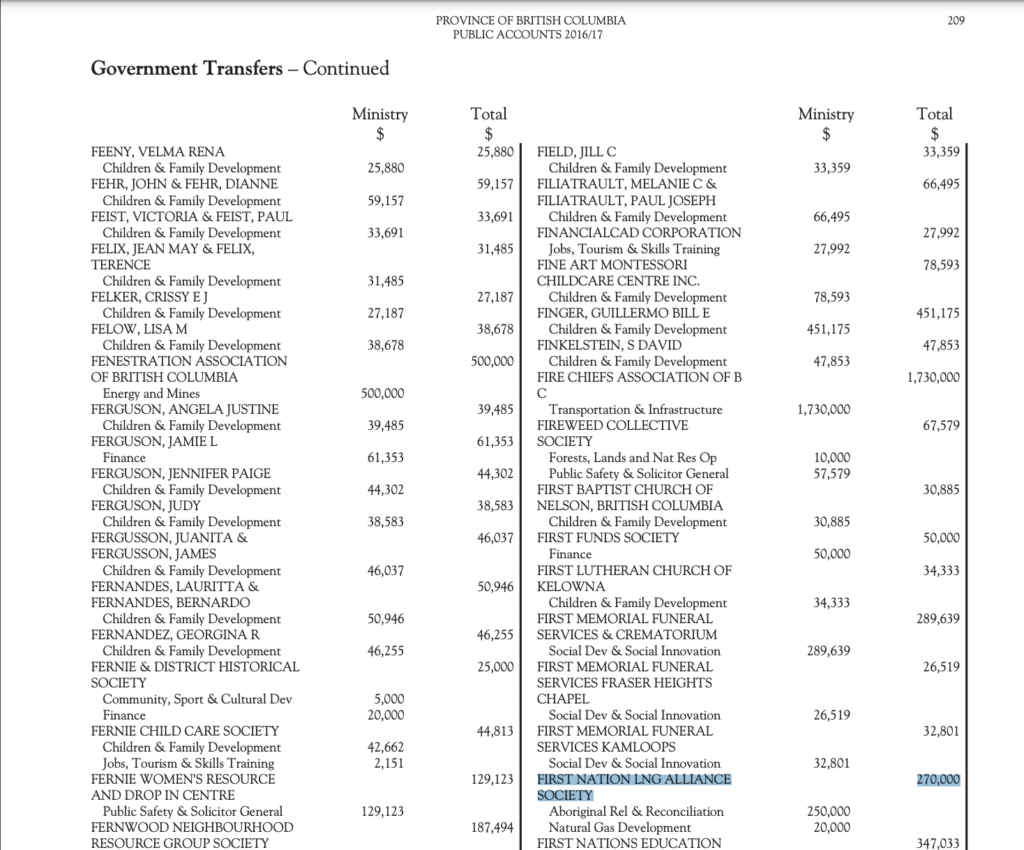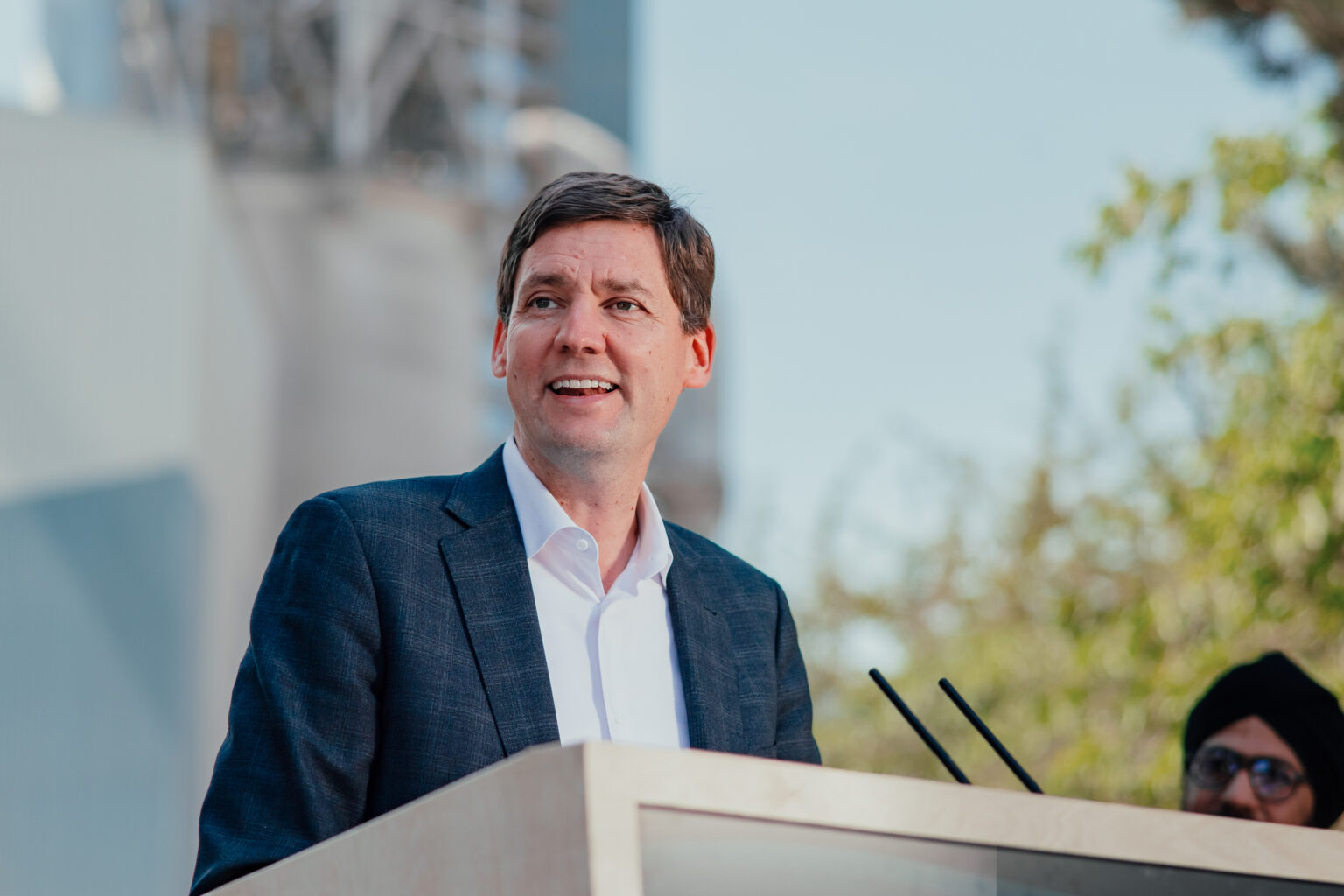An industry group that’s called Canada’s federal climate targets “unachievable” and referred to opponents of oil and gas expansion as “climate alarmists” has received nearly $1.23 million in taxpayer money from the British Columbia government.
The First Nations LNG Alliance is among the country’s loudest advocates for projects that can export billions of cubic feet per day of liquified natural gas from Canadian shores to foreign markets. It counts among its affiliate members LNG Canada, a $40 billion gas export project on B.C.’s northwest coast led by Shell, Petronas, PetroChina, Mitsubishi and Korea Gas.
The group, which describes itself as a “collective of First Nations who are participating in, and supportive of, sustainable LNG development in BC,” last September urged Canada to scale back national climate targets the country agreed to following the 2015 Paris Climate Accords, saying in a federal submission that “the climate goals are unrealistic ‘pie in the sky.’”
The First Nations LNG Alliance has been funded for years by the B.C. government, according to documents newly reviewed by DeSmog, despite provincial leaders repeatedly claiming to have one of the world’s most ambitious climate plans.
“The purpose of the funding was to support the organization with projects as jointly agreed to with the Province, such as community engagement with First Nations,” a B.C. government spokesperson wrote to DeSmog.
The First Nations LNG Alliance didn’t respond to questions about the funding.
The First Nations LNG Alliance was incorporated in December 2015, and public records show that the group received a “government transfer” of $270,000 the following year. The B.C. government has funded the LNG Alliance ever since, transferring six-figure amounts annually.
“The Alliance was formed to…cooperatively advance shared interests with industry and government,” according to notes from a 2017 liquified natural gas meeting that included senior bureaucrats from the B.C. and federal government, as well as First Nations representatives supportive of the industry.
The notes, which were made public following a freedom of information request, suggest that making First Nations the face of new LNG projects could help win over investors and neutralize opponents of gas expansion.
“First Nations leaders should be in front of proponents to communicate this support because overseas proponents are paying attention to opposition groups,” read speaking notes from the event. “But investors aren’t hearing from those who support these projects.”
“When First Nations are willing to step up to the plate and promote the LNG industry, you cannot help but be optimistic about where we’re going,” Alden Evans, vice president for LNG at the consulting group Advisian Americas, recently said at the Canada Gas & LNG Exhibition and Conference in Vancouver.

When speaking to supporters, B.C. government representatives appeared to brush aside environmental concerns. “LNG is colourless, odourless, noncorrosive, non-combustible and nontoxic. If exposed to air, it quickly vaporizes back to its gas form. LNG leaves no polluting residue,” read speaking notes from 2017 attributed to Simon Coley, assistant deputy minister in the B.C. Ministry of Energy, Mines and Low Carbon Innovation.
Yet fracking sites where B.C.’s gas is extracted are so environmentally disruptive that they are potentially pushing caribou herds to extinction. And the industry’s freshwater needs could be on pace to reach 10.4 billion litres annually. Meanwhile, fracking produces enormous volumes of wastewater containing toxic chemicals like arsenic and lead.
“The LNG industry in northern British Columbia has had a catastrophic impact on the integrity of the environment insofar as the fracking sites are concerned,” Grand Chief Stewart Phillip, president of the Union of BC Indian Chiefs, told DeSmog. “You can’t greenwash the fracking impacts of LNG.”
Then there’s the climate impacts. The first phase of Shell’s LNG Canada project could produce annual emissions equivalent to 800,000 new cars. If B.C. adds to that Cedar LNG, a proposed export project owned by the Haisla Nation and Calgary-based Pembina Pipeline Corporation, it could be impossible for the province to meet its net-zero emissions targets.
B.C. Premier David Eby made no mention of that during an Earth Day speech this year, in which he claimed that the province’s CleanBC Roadmap to 2030 is “one of the most progressive climate action plans in North America.”
His government announced earlier this year that new liquified natural gas facilities must “pass an emissions test with a credible plan to be net zero by 2030.”
Yet the First Nations LNG Alliance sees ambitious climate action as an impediment to oil and gas expansion. It argued to the federal government last year that trying to hit net-zero targets at a national level is “unachievable.”
“In particular,” it wrote in a submission, “the immediate social and economic shock of achieving a 40-45% economy-wide reduction in GHG emissions below 2005 levels by 2030 – a mere seven years – would be devastating.” The group is specifically opposed to a proposed federal cap on oil and gas emissions, claiming that the sector’s vast climate impacts are “essentially meaningless at a global level.”
The year that it made that submission, the First Nations LNG Alliance received $170,000 from the B.C. government’s Ministry of Energy, Mines and Low Carbon Innovation. Yet in an open letter to B.C. NDP Premier Eby this February, the group accused the province of not doing enough to support the liquefied natural gas industry.
“We are also fully aware that your office is under extreme pressure from certain members of caucus and various ill-informed NGOs who believe that the province should immediately cease all traditional energy development, regardless of the economic and human consequences,” it wrote, referring to gas opponents as “climate alarmists.”
In a separate op-ed the organization accused environmentalists of practicing “eco-colonialism.”
“Being pushed to the economic margins by climate activism would be as tragic as the original colonial dispossession,” wrote Crystal Smith, elected chief councillor of the Haisla Nation and chair of the First Nations LNG Alliance.
Grand Chief Phillip acknowledges that oil and gas projects can provide temporary jobs and revenues for First Nations communities. “But this notion that it’s a viable sustainable economy in the long-term is bogus,” he said. “They’re very short-term projects. It’s here today and gone tomorrow. Oil and gas represents a false economy.”
Subscribe to our newsletter
Stay up to date with DeSmog news and alerts






